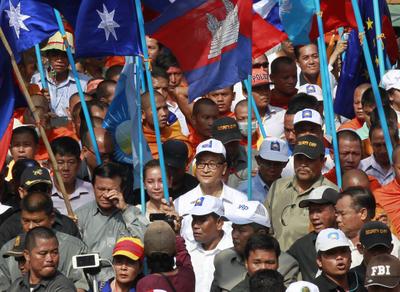The CNRP has demanded an independent investigation into the alleged malpractice and has employed various strategies, including mass protests, a parliamentary boycott and diplomatic lobbying, to discredit the CPP’s claim to victory. It is obvious that an independent verification of the alleged fraud, let alone an attempt to overturn the results, is impossible within the current political context. The question then is why has the CNRP continued to pursue this strategy?
Firstly, because if the CNRP accepts the results of the election, or negotiates with the CPP through back channels, the CNRP’s credibility will be at risk. Its supporters, many of whom used to back the royalist FUNCINPEC party, will liken Sam Rainsy and Kem Sokha to Prince Norodom Ranariddh, who was seen as a self-interested politician — a state of affairs that erased FUNCINPEC and Prince Ranariddh from the Cambodian electoral map. Second, demonstrations are the best avenue for the CNRP to raise its visibility among the Cambodian public. Sam Rainsy has been well known for his bravery in standing up to the CPP, and recent protests indicated his determination to challenge the status quo. After all, Sam Rainsy rose to fame in Cambodia through organising protests that in the 1990s and early 2000s earned him the nickname the ‘CEO of demonstrations’.
The second strategy the CNRP took was boycotting the National Assembly in order to provoke a constitutional crisis, by denying the CPP the required quorum to form a new government. This strategy has not yielded any fruit so far in the absence of strong international pressure through US and EU trade sanctions, the suspension of aid, or votes to vacate the Cambodian seat at the United Nations — as was the case in 1997 following the violent ouster of Prince Norodom Ranariddh by then Second Prime Minister Hun Sen. At the moment the situation in Cambodia is not so grave that it warrants such drastic action. Though corrupt and authoritarian, the Hun Sen government has been able to provide stability and sustained economic growth. Furthermore, the Hun Sen government has secured backing from China, which is ready to fill any vacuum created by the West.
Some analysts argue that the CNRP pursued the wrong strategy by boycotting the National Assembly. But participating in the National Assembly without gaining major leadership concessions from the CPP would be erroneous for the CNRP. Sam Rainsy in 2005 collaborated with the CPP to amend the constitution from the two-thirds majority required for the formation of government to a simple majority. Through that strategy Sam Rainsy succeeded in destroying Prince Ranariddh/FUNCINPEC’s political future. From 2005 onward, the battle would be between Sam Rainsy (and later Kem Sokha) and Hun Sen. The great showdown came with this election. The electoral contest, allegations of fraud notwithstanding, almost tipped towards the CNRP, which won 2.9 million votes compared to the CPP’s 3.2 million. But the 2005 constitutional amendment also rendered the CNRP’s minority status powerless in the National Assembly. For this reason the CNRP must be tough in its pressure for a power-sharing arrangement.
One might argue that the CNRP could lose face if it fails to extract concessions from the CPP, but this seems unlikely. The public knows the limits of the CNRP’s manoeuvring and the CPP’s monopoly on power. The real concern is that the public could become alienated from politics as they lose hope in all possibility of change. But even this seems far-fetched: Cambodia’s changing demography means that youth under the age of 25 will soon constitute the majority of voters. They will continue to support opposition efforts at political transformation if social injustice, nepotism, corruption and inequality remain high. Moreover, things have also changed in the countryside, the CPP’s traditional base. The CPP’s patronage-based material inducements and surveillance techniques are no longer sufficient to win rural votes. Voters want programmatic policy changes.
In the final analysis, this election proved to be a wake-up call for the CPP leadership, who now realise the need for reform on key issues like nepotism, land grabs, civil servant salaries and corruption. If the CPP fails to initiate meaningful reforms then it will face even more vocal opposition, backed by an even more restless youth. Such grievances will be strong during the next few elections and will become explosive if economic recession hits the country. If the outcome of this election pressures the CPP government to undertake significant positive reforms then it is a great victory for all Cambodians, and the CNRP should be proud of the fact that it was at the frontline of forcing these reforms.
Kheang Un is Assistant Professor of Political Science at Northern Illinois University.

